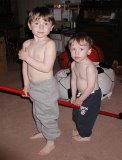Stage 2
 We spent a very short time in stage two, just a few months. Honestly, we probably could have moved on to Stage 3 about two weeks after our RDA, because I think Jacob pretty much mastered Stage 2 during the course of his RDA. It just seemed to be a lightbulb moment sort of thing for him -- "Oh, you mean if I look at your face, you'll have important information for me? Cool!" But we did spend a couple of months working on Stage 2, to make sure he really had it down, and because I was having a hard time believing it was this "easy". (Don't worry, we made up for our "easy" time with this by spending an entire year in Stage 4!)
We spent a very short time in stage two, just a few months. Honestly, we probably could have moved on to Stage 3 about two weeks after our RDA, because I think Jacob pretty much mastered Stage 2 during the course of his RDA. It just seemed to be a lightbulb moment sort of thing for him -- "Oh, you mean if I look at your face, you'll have important information for me? Cool!" But we did spend a couple of months working on Stage 2, to make sure he really had it down, and because I was having a hard time believing it was this "easy". (Don't worry, we made up for our "easy" time with this by spending an entire year in Stage 4!)Stage 2 is "Social Referencing", which basically means that the child figures out that he can receive pertinant information by checking in with your facial expression and body language. A simple example of this in everyday life would be saying "oh look!" and the other person referencing you to see what direction you're looking in so that they can see whatever it is you are refering to.
A lack of the ability to reference looks something like this (in a real life example from a typical interaction between The Map Man and me): "Honey, can you get me that box?" as I look across the room at a box sitting conspicuously on top of the table. "What box?" says he. "That one right there" I say, waggling my chin in that direction. "Where?" says he. "Sitting right over there" I say, starting to get annoyed, dropping the armful of toys I'm holding to point in the direction of the book. "Sitting where?" he says, equally annoyed because it hasn't occured to him that he could just LOOK at me and figure out where I was talking about. I can attest, it's VERY difficult dealing with a person who has no Social Referencing skills!! But the poor guy has had about 40 years of using spoken language as a compensation for this missing piece of the puzzle, so it's hard for him to learn how to reference now. Certainly gives us plenty of motivation to make sure Jacob gets these sorts of things in place!
Tomorrow I'll specify some of the specific activities I did with Jacob in this stage, but the general theme was to just set up situations in which he needed to look at me to gain information as to where something is, or which item to pick up, or where to put something. It's really important when working on Stage 2 that the child NEED to reference you for the information. If you just set up an activity where the answer is obvious, there is no need for referencing, and in fact it would be unnatural for them to do it. For example, in the box example above, if I'd initially said "honey, can you get me that box on the table", it would have made no sense for him to try to reference me.
Initially when working on Stage 2, the child is not going to know that they can get information from looking at you. So you start out scaffolding this by saying "I know where it is" or "I know which one you should choose". You can also use clearing your throat, coughing, sighing, saying "Hmmmmm." or "I wonder...". Anything that encourages the child to think to look at you. Eventually, after some successes and as your child gains competence, you scale back the scaffolding until you eliminate it completely because the child is understanding that looking at you will give them the information they need to be successful.
This is very different from other "Autism treatment programs" that teach children eye contact as a discreet skill. Of course you can teach the child to look into your eyes, but if they haven't learned that they can get important information by doing that, it's just a rote excercise without social benefit. "Eye contact", in a more natural state, is a by product of the child's desire to Experience Share with you, and their understanding that you have important information to share with them that can be gleaned by looking at your non-verbal language. So we never actually work on "eye contact" in RDI, it just develops naturally as we move through the first couple of stages.


1 Comments:
Sophia, there is a Progress Tracking Form that parents get from their consultant that lists the objectives for each Stage. The parents and their consultant review to see if the child has met the criteria for mastering the stage. So for example, in Stage 2, one of the objectives reads: "References Coach's [that's the parent] emotional expressions in situations where facial communication can solve a problem or lead to a correct decision." There are 11 objectives for the current Stage 2. Reviewing for this sort of thing happens bi-weekly (or monthly, depending on the program you have set up with your consultant), and this is also to the sort of thing that is tested for during the RDAs, which ideally occur every 6 months.
Post a Comment
<< Home